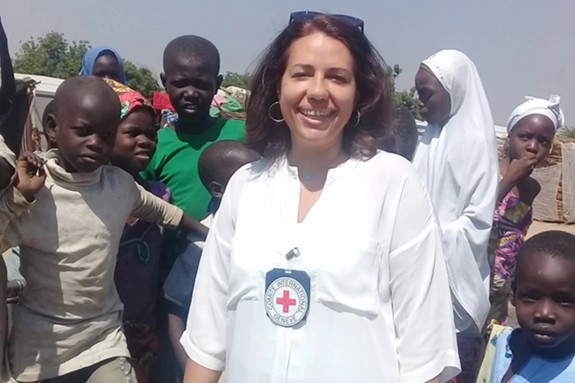“Every mission is a discovery, that is why I love working in the field”
After working as a radio operator for the ICRC in Iraq, May Mousa slowly moved her way into the Water and Habitat unit (WatHab). She eventually had to leave the ICRC and Iraq but always kept her eye out for job openings at the ICRC. “I had a private business, but it was not satisfying - I wanted to make a bigger impact. I bugged everyone I knew until I found a way to get back into the ICRC. Luckily I got sent on a mission soon after and I never looked back ever since.” Now May is the WatHab coordinator in Abidjan, Ivory Coast. In February she will transfer to Juba, South Sudan.

“Working for the ICRC is a lot of ups and downs, but I enjoy it a lot. My work has challenged me and given me purpose. My first mission was in Burundi. I had to use my French skills, so that gave an extra challenge, but I was determent to learn it. Quitting was simply not an option. Because I really believe we do make a difference, no matter how small. It is priceless to see a woman dance because we gave her shelter materials or people celebrating because they have received access to clean water – it means everything. It makes all the hard work and challenges worth it.”
”It felt like being thrown into the deep end, but I managed to keep my head above water”
“Everything has been a learning experience: From leaving home and being in protected environment, to going out to the field without any international experience. It felt like being thrown into the deep end, but I managed to keep my head above water. The biggest wealth I gained, besides the professional experience and technical knowledge, is the people I have met. I discovered different cultures and lived in situations I never thought I would experience, and I believe this is more valuable than anything else.”
“All the projects I have worked on have been interesting and meaningful, but the beauty of working in WatHab is that we don’t do the same thing every day. Every mission is different; every new mission is a discovery. That’s why I love working in this field.”
“I have found that being a woman in the humanitarian field can be an advantage. Even if some men do not want to listen to you, they still respect you. Although I have to say that as a woman it took me a bit more effort to get where I am today. By default, women are often expected to keep a low profile and are easily dismissed. So I realized I had to work extra hard to have my voice heard. Having said this, I was never discouraged. I kept doing a good job, showing my skills and I proved my worth.”
May Mousa
ICRC
